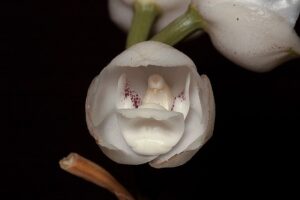
A Meditation on Psalm 90
O God, our help in ages past, our hope for years to come,
Our shelter from the stormy blast, and our eternal home.
Time, like an ever rolling stream, bears all its sons away:
They fly, forgotten, as a dream dies at the opening day.
— Hymn 680, 1980 Hymnal
Dove Orchid – image by Kalyan Varma. CC BY 4.0
Psalm 90 is unique in that it is the only Psalm attributed to Moses. One can imagine Moses writing it as he looks out over the Promised Land after climbing Mount Nebo. On the one hand, the Promised Land is in sight. On the other hand, is the pain that comes in the realization that neither he nor the generation he had led for the past 40 years was going to enter it. The grumbling and disobedience of that generation had become too big an obstacle. The wages of sin was and always has been death. It started in the Garden and continues to this day.
As I read verse 6, “We are like the grass, which in the morning is green, but in the evening is dried up and withered,” I am reminded of a spring soon after Cindy and I were married. We had ordered seeds from a catalog. We planted them with care inside our home. We were thrilled as they grew and had visions of wonderful tomatoes. When the seedlings were about four inches high, we set them out in the yard to “toughen them up.” A few hours later our beautiful seedlings were withered ribbons of destruction. The reality is that our lives on earth are much like that. Verse 10 of Psalm 90 puts it well, “The days of our lives are seventy years, and though some be strong that they come to eighty years, yet is their span but labor and sorrow; soon it passes away, and we are gone.”
Psalm 90 can be pretty depressing but it also bears seeds of hope. It is best seen as a contrast between God and man. God is clearly revealed as holy and eternal. Man is portrayed as sinful and short-lived. It was not always meant to be this way. When we were created we were in the Garden and had access to the Tree of Life. We were given the ability to love God and each other with our whole hearts, minds, and strength. But we chose to disobey. In doing so our lives became finite and work was cursed with thorns and briers. I’ve often only thought that the curse was found in farming. I’ve pulled enough weeds to know the curse is still in effect. The longer I live, I see weeds and thorns in all our labors.
The mood of the Psalm shifts in verse 12, “Teach us to number our days, that we may apply our hearts to wisdom.” The wise man does not live like a teenager who believes they will never die. The wise man realizes we are sinners whose time is short and we need to use that time wisely in seeking the will of God and allowing the work of our hands to bring glory to God. “Let your light so shine before men that they may see your good works and glorify your Father in heaven.” —Matthew 5:16 The Psalm moves away from God’s wrath toward sin and shifts to his grace love and mercy. “Turn again, O Lord, be gracious unto your servants.”
God answered that prayer by sending the Holy Spirit to help us renew our minds and have a new heart. He also sent his Son who bore the curse of the thorns upon his brow and gave us his own righteousness. He conquered death upon the cross and paid the penalty for the sins of the world. We no longer need to live in fear of death or shortness of life because of God’s love and grace. Because the curse of thorns and thistles has been dealt with, the work of our hands can prosper and we can let our light shine and bring glory to God. We who love him have been brought from the kingdom of darkness into his glorious light and will no longer wither like the grass.
†Bishop Mark

